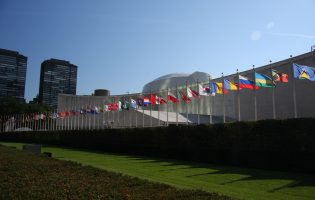
Rainbow Politics: Comparing LGBT+ Rights in Germany and the United States
On October 1, 2017, Karl Kreile and Bodo Mende exchanged vows at the town hall in Schöneberg—the first same-sex couple married in Germany. More than two years earlier, the United …
Human remains of Ovaherero and Nama: Transnational dynamics in post-genocidal restitutions
Former DAAD/AGI Research Fellow Elise Pape’s latest article is now available. Published in Volume 4, Issue 2 of Human Remains and Violence: An Interdisciplinary Journal, the article builds on Dr. Pape’s …

The Radicalization of the Extreme Right
The Rallies in Charlottesville in August 2017 and Chemnitz in August 2018 In August 2017, members of multiple far-right movements rallied in Charlottesville, Virginia, with the goals of uniting the …

Mothers: Remembering Three Women on the 80th Anniversary of Kristallnacht
Ida was terrified. She figured she would never see either her husband or brother ever again. For several days she fretted, not knowing what to do. While desperately trying to …
Recent Authors
AGI provides knowledge, insights, and networks as tools to solve the challenges ahead.
Support Our WorkHajo Funke, DAAD/AGI Research Fellow
AGI is pleased to welcome Prof. Dr. Hajo Funke as a DAAD/AGI Research Fellow from October to December 2018. Prof. Dr. Hajo Funke is a DAAD/AGI Research Fellow from October to …

Workforce Integration of Immigrants in the United States and Germany
Local and Religious Perspectives As immigrants and refugees arrive in both the U.S. and Germany, they must quickly navigate new bureaucracies, languages, and workforces. Religious institutions and organizations are key …
Ufuk Topkara, DAAD/AGI Research Fellow
AGI is pleased to welcome Ufuk Topkara as a DAAD/AGI Research Fellow from October to December 2018. He has been active in promoting inter-religious dialogue since 2005 as an expert on …

Germany’s Confrontation with Its Colonial History: Are There Lessons from Grappling with the Nazi Past?
The anti-immigrant riots in Chemnitz at the end of August 2018 with their expressions of hate, intolerance, and xenophobia, including Nazi salutes, have led observers to question the depth of …

The First Genocide of the Twentieth Century
The recent handover of the remains of 27 individuals from Namibia that took place at the French Friedrichstadt Church in Berlin marked an important milestone in the process of questioning …
AGI Launches Project on Integration in Germany as part of the “Year of German-American Friendship”
Washington, DC, October 3, 2018 – The American-German Institute (AGI) at Johns Hopkins University announced today that it has received a grant from the German Federal Foreign Office to support …





